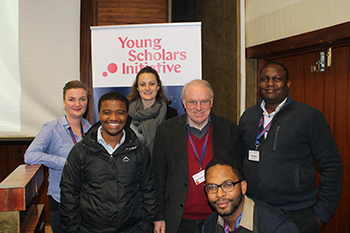Latest News Archive
Please select Category, Year, and then Month to display items
![]()
“A mind that is learning is a free mind and freedom demands the responsibility of learning” – J. Krishnamurti. What is the essence of education in our modern society amid the emerging, unprecedented, present-day circumstances? On 27 November 2020, third-year students from the University of the Free State (UFS) not only sought to inspire the youth in Kestell and bring them messages of hope, but also actively engaged them on how to be equipped with the necessary skills that would help them surf through the rapidly advancing world economics and the changing labour-market demands.
The collaboration with other expert stakeholders created a platform for significant conversation about alternative skills training that is designed to successfully address the current economic needs, thus enabling education to thrive and serve the intended purpose, which would ultimately manifest in effective transformation within communities. The UFS Qwaqwa Campus Community Engagement office coordinated the teamwork, comprising the Free State Department of Social Development, Maluti TVET College, the Free State School of Nursing, AGAPE Foundation for Community Development, Japie Lepele Foundation, the Riverside Finishing School, and Advance Academy.
TVET education allows students to progress in fields that suit them best and at the same time acquire skills needed for the future world of work. Information Technology (IT) students and staff members shared encouraging testimonies of their education experience and employment. The academy presented their finishing school programme to encourage learners to complete their secondary education even after they have suffered some interruptions. Although there are currently many challenges facing education in our semi-rural areas – such as Kestell – that result in lack of access to education and insufficient resources, civil partnerships like these are supporting and enabling communities in their quest to find their own solutions.
Professor from Cambridge University addresses young scholars
2017-07-18

In the first conference of its kind on the African continent,
the Universityof the Free State’s Bloemfontein Campus
was privileged to host the Young Scholars Initiative conference.
Photo: Siobhan Canavan
“It doesn’t matter where a concept originates from if it works. The problem arises when the concept does not work.”
These were the words of Prof Gareth Austin in his address at the Young Scholars Initiative (YSI). His keynote focused on the “Economic History in Africa’s Decolonisation and Development”.
The African economic history
Prof Austin, a professor in Economic History at the University of Cambridge, discussed how African economic history has always been about development, and also gave a brief periodisation of the economic historiography of Africa.
In his closing remarks he focused more on history and economics. “Economics is a sensible approach to take, where history matters because of the sense of context.”
Reflecting on the African experience
A total of 65 young and senior scholars from five continents attended the conference Decolonising Africa? The Economic History of Development, hosted by the YSI in partnership with the International Studies Group at the UFS.
The conference, held from 8 to 9 June 2017, provided an opportunity to reflect on the African experience from an historical perspective and to assess the current position of the continent in the global economy. It discussed new themes in development, such as the role of women, minorities, and entrepreneurs.
The conference focused on how the business community has operated in an Africa that still faces inequalities and unfair terms of trade and lacks a unified political will.